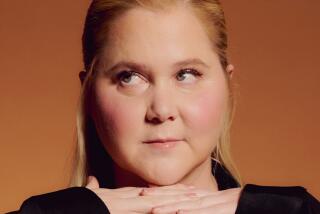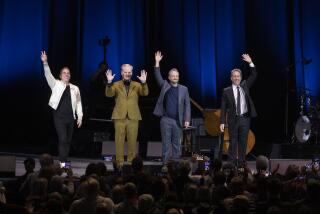Critic’s Pick: TV Picks: Tig Notaro, Amy Schumer, Neil DeGrasse Tyson, Hubble
- Share via
“Knock, Knock, It’s Tig Notaro” (Showtime, premieres Friday). A beautifully made documentary road picture, codirected by Michael LaHaie and Christopher Wilcha, that accompanies comedian Tig Notaro and opening act/driver John Dore, on a 2013 summer house-concert tour (a house, field, pop-up venue tour, to be precise).
Notaro fans applied to be her hosts. “Are you at all scared of these people?” asks Nick Kroll, to whom Notaro is showing videos from some of them, before leaving. “Absolutely,” she replies. (Kroll: “Have you performed in a barn?” Notaro: “Yeah. I’ve been doing this 17 years.” Kroll: “Have you ever performed for a swamp full of alligators?” Notaro: “No, I’ve only been doing stand-up for 17 years.”) She had done this sort of performance before, as “an experiment in seeing if I could do comedy in a nontraditional venue,” but frames the present trip, which followed a well-publicized series of health crises and the death of her mother, as a way to get to know her audience.
Slight but steely, she seems like someone who could take you without lifting a finger, by the power of her regard and her clown horn imitation. (“You realize what you’re laughing at? It’s not much at all.”) A lot of what she does onstage — not uniquely but with uncommon brilliance — involves shaping the room, playing the crowd, channeling the energy and the temperature. “Knock, Knock” focuses on the off-book, moments, the unplanned exchange leading to the unpredictable conclusion.
Like all road movies, this one is about the temporary intersection of worlds — the portable world of the performers and the settled worlds they pass through. The dates run from Chicago into the South, through impressive weather, green fields and mossy swamps, down to Mississippi, where Notaro was born. She and Dore make good company for each other and for the viewer. Driving along they create bits, engage in horseplay; they stop in thrift stores (“Tig, do you need soccer cleats — with the dirt still on them?”), buy fireworks and shoot them off. Some of their hosts build bigger shows around them, with bands and other comics; some venues are spectacularly intimate — this is close-work comedy. It feels daring, and it feels joyous.
The film winds up in Pluto, Miss., “population eight or nine on a good day,” with a performance in a field, on a flatbed trailer lighted by tractor lights. The sky is full of muscled clouds. It rains a little. Tig plays some drums.
“Inside Amy Schumer” (Comedy Central, Tuesdays). This polymorphous satirical sketch show, which includes stand-up segments and interviews, returns for a third season, clad ever more gloriously in recognition and approval and no less daring for it. Much of the humor is very on point, but the writing is so smart and the execution so accomplished and the performances so good that the work manages to be somehow subtle and obvious at the same time; it is no less funny for making its intentions abundantly clear: a “Friday Night Lights” parody has Josh Charles as a new high school football coach instituting a no-raping policy. “No raping? But, coach, we play football.” “Can we rape at away games?” “What if it’s Halloween, and she’s dressed lilke a sexy cat? …. What about a sexy owl?” “What if my mom is the D.A. and won’t prosecute?” “The girl said yes to me but it was about something else?” (“How do I get through to your boys that football isn’t about rape? It’s about violently dominating anyone who stands between you and what you want?”)
It’s an intently feminist comedy, critical of a world, and the media world within and influencing the wider world, in which men make the rules and (some) women (still) let them -- but implicitly hopeful, by the example of its own transformative mockery, for a post-categorical liberated future. Much of it has to do with female body issues and issues with the female body, and Schumer’s sacrifice of her own non-Hollywood form to the humor is a recurring strategy, and also a theme -- as in an upcoming episode-length, pitch-perfect parody of “12 Angry Men,” in which the star barely appears, where a jury whose members include Jeff Goldblum, Paul Giamatti and Vincent Kartheiser debates whether she is sufficiently hot for basic cable television. (That she is actually attractive is less disingenuous than it seems; standards of beauty are all out of whack.) In one sketch, she stumbles upon Julia Louis-Dreyfus, Tina Fey and Patricia Arquette picnicking in a park to ritually mark the end of Julia’s bankable attractiveness and a future in which “the poster for your movie is like a picture of a kitchen” and has a title like “Whatever It Takes” or “She Means Well.” In “Plain Jane,” Schumer plays a female police detective whose ordinary looks make her invisible to criminals -- she’s mistaken for a bag of an old leaves, a bunch of cookie dough, a composter, an inflatable snowman. And in a pastiche music video a boy band praises her “natural beauty” then, confronted with it, reverses gears: “I didn’t know that your lashes were so stubby and pale/Just a little mascara, you’ll look female.”
“Star Talk” (National Geographic Channel, Mondays); “Hubble’s Cosmic Journey” (National Geographic Channel, Monday). With “Star Talk,” astrophysicist Neil deGrasse Tyson begins a weekly late-night TV talk show -- it airs Mondays at 11 p.m., with a 7 p.m. repeat the following Friday -- based on his podcast and Web series. The format is the same: Tyson, the current American Face of Science, interviews a famous cultural, pop-cultural or scientific person (George Takei in the premiere, Christopher Nolan, Dan Savage, Richard Dawkins, Jimmy Carter, Arianna Huffington and Norman Lear in episodes to come) and then plays back bits of the conversation for his guests -- scientists, comedians or some combination of the two -- for commentary, ironic or enthusiastic. Curiosity is what makes good scientists and good talk show hosts alike, and Tyson has it to spare. For a man of importance and authority -- he’s the director of the Hayden Planetarium at the American Museum of Natural History, where the series is shot before a small audience -- he’s one goofy big kid; his excitement and enjoyment and sense of fun are catching. Science guy Bill Nye has his own prerecorded segment, in which he “rants.” It’s worth noting that this adds another African American host to the late-night landscape -- the latenightscape. Not a lot of women in the lineup, though, which is a subject the host might usefully explore in some future episode.
Tyson is also the narrator of “Hubble’s Cosmic Journey” a 25th-anniversary celebration of the launch (nearly to the day) of the Hubble Space Telescope. Hubble changed the way we picture space, from a scattering of white pinpricks on a black background to a multicolored, multilayered, implicitly active whirligig wonderland of Venetian-glass galaxies and towering pillars of gas, as it exponentially extended our view into space and time: It can see billions of years into the past. “The most beloved scientific instrument in history” Hubble is called here; and though that statement might use some testing, there’s no doubt that the people interviewed, responsible for various stages of Hubble’s selling, creation, launching and repair, regard it it almost as a living thing. (“I really felt like I was with an old friend,” says spacewalking astronaut, physicist and Hubble tech John Grunfeld of one return visit). It’s an often tense story of imagination, myopia and corrective lenses, of sticky solar arrays and tight bolts, bureaucratic failures and triumphs of engineering -- but it all works out beautifully in the end.
Robert Lloyd’s on Twitter @LATimesTVLloyd
More to Read
The complete guide to home viewing
Get Screen Gab for everything about the TV shows and streaming movies everyone’s talking about.
You may occasionally receive promotional content from the Los Angeles Times.







